大家单片机玩得很溜了,平时也很少去关注VDD波形,整机测试无异常就完事了。也确实,芯片技术发展多年 前言 最近发现IAR 发布了新版本9.30.1,在新版本中Geehy的众多MCU都完成了支持。
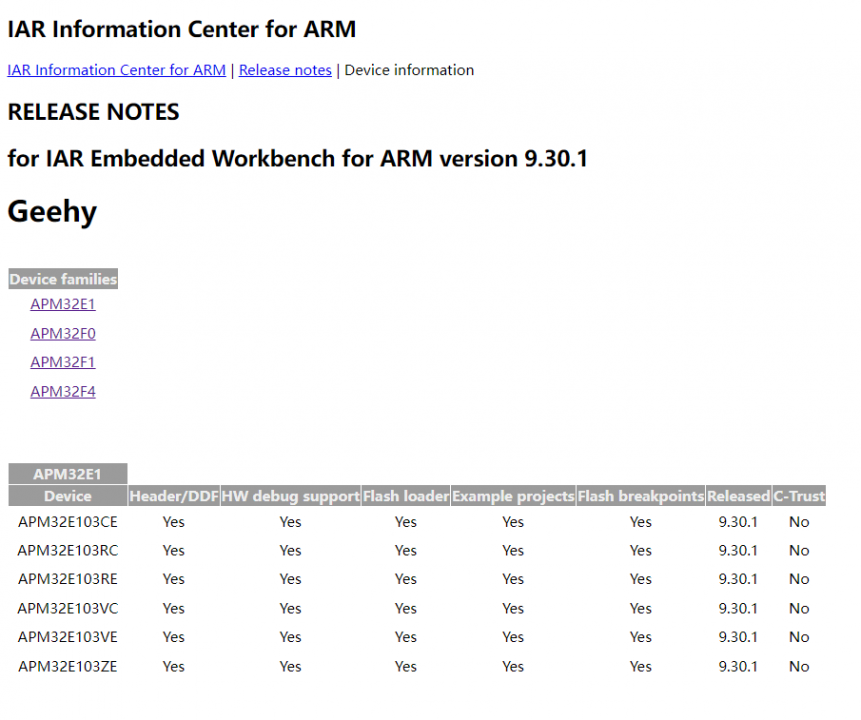 我这边刚好有APM32F407IG的MINIBOARD,想着使用IAR编译一下工程下载运行一下程序。不料却发现了问题,APM32F4xx_SDK_V1.1中的IAR例程是基于 IAR8.5制作的,关于printf的重定向都已经在工程内进行了设置。使用8.5的工程也可以正常使用printf功能。但在9.x的IAR对printf重定向有了新的要求,导致IAR 9.x版本无法运行含有printf功能的例程。
本文档就解决APM32F4xx_SDK_V1.1中使用IAR9.3进行编译使用printf功能进行记录分享。
值得注意的是:
- printf重定向前需完成对应串口的初始化操作。
1 IAR 8.x的printf重定向
IAR 8.x的printf重定向与Keil并无差异,仅需在内部的任意一个C文件中重定向printf后设置工程的相应参数即可完成。
1. 重定向printf代码如下(发送串口为串口1,头文件需包含stdio.h)
我这边刚好有APM32F407IG的MINIBOARD,想着使用IAR编译一下工程下载运行一下程序。不料却发现了问题,APM32F4xx_SDK_V1.1中的IAR例程是基于 IAR8.5制作的,关于printf的重定向都已经在工程内进行了设置。使用8.5的工程也可以正常使用printf功能。但在9.x的IAR对printf重定向有了新的要求,导致IAR 9.x版本无法运行含有printf功能的例程。
本文档就解决APM32F4xx_SDK_V1.1中使用IAR9.3进行编译使用printf功能进行记录分享。
值得注意的是:
- printf重定向前需完成对应串口的初始化操作。
1 IAR 8.x的printf重定向
IAR 8.x的printf重定向与Keil并无差异,仅需在内部的任意一个C文件中重定向printf后设置工程的相应参数即可完成。
1. 重定向printf代码如下(发送串口为串口1,头文件需包含stdio.h)
/* Includes */
#include "stdio.h"
/*!
* [url=home.php?mod=space&uid=247401]@brief[/url] Redirect C Library function printf to serial port.
* After Redirection, you can use printf function.
*
* @param ch: The characters that need to be send.
*
* @param *f: pointer to a FILE that can recording all information
* needed to control a stream
*
* @retval The characters that need to be send.
*/
int fputc(int ch, FILE *f)
{
/** send a byte of data to the serial port */
USART_TxData(DEBUG_USART,(uint8_t)ch);
/** wait for the data to be send */
while (USART_ReadStatusFlag(DEBUG_USART, USART_FLAG_TXBE) == RESET);
return (ch);
}
2. 设置工程相应参数,将General Option 的 Library Configuration 选项卡下Library选择为“Full”,CMSIS 项目勾选“Use CMSIS”。
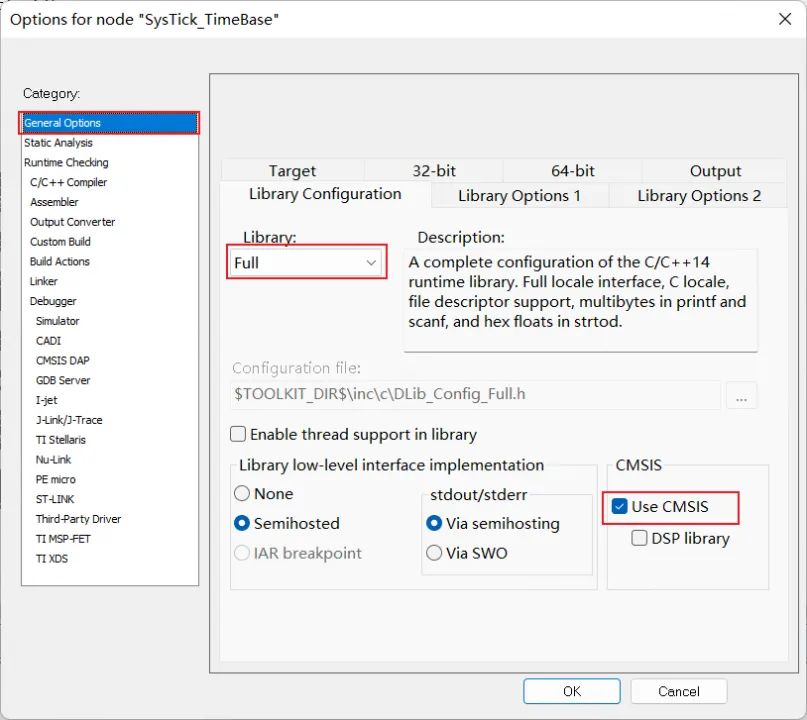
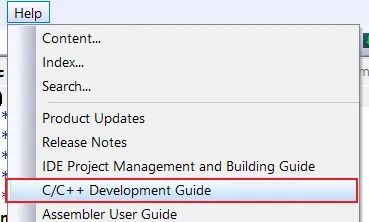
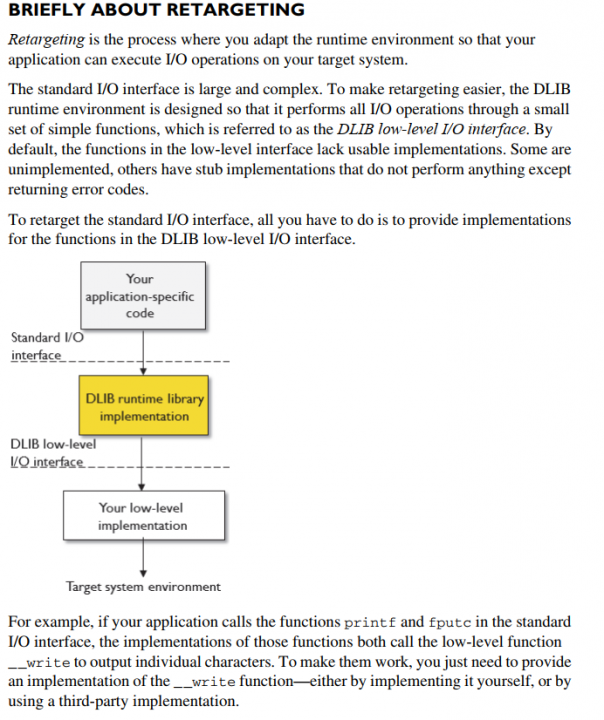
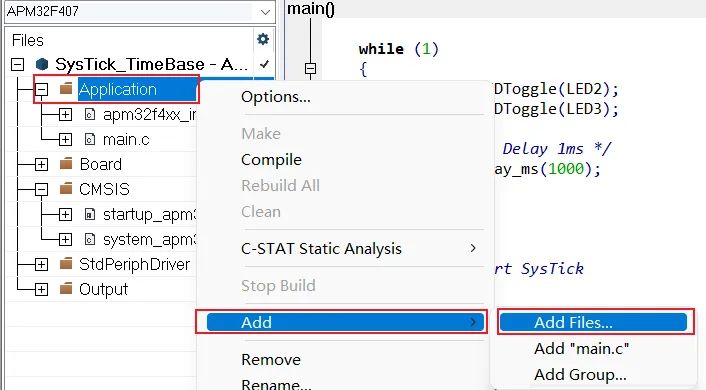
/*******************
*
* Copyright 1998-2017 IAR Systems AB.
*
* This is a template implementation of the "__write" function used by
* the standard library. Replace it with a system-specific
* implementation.
*
* The "__write" function should output "size" number of bytes from
* "buffer" in some application-specific way. It should return the
* number of characters written, or _LLIO_ERROR on failure.
*
* If "buffer" is zero then __write should perform flushing of
* internal buffers, if any. In this case "handle" can be -1 to
* indicate that all handles should be flushed.
*
* The template implementation below assumes that the application
* provides the function "MyLowLevelPutchar". It should return the
* character written, or -1 on failure.
*
********************/
#include
#include "Board.h"
#include "apm32f4xx.h"
#pragma module_name = "?__write"
uint8_t USART_Transmit(USART_T* usart, uint8_t *pdata, uint16_t Size);
/*
* If the __write implementation uses internal buffering, uncomment
* the following line to ensure that we are called with "buffer" as 0
* (i.e. flush) when the application terminates.
*/
size_t __write(int handle, const unsigned char * buffer, size_t size)
{
if (buffer == 0)
{
/*
* This means that we should flush internal buffers. Since we
* don't we just return. (Remember, "handle" == -1 means that all
* handles should be flushed.)
*/
return 0;
}
/* This template only writes to "standard out" and "standard err",
* for all other file handles it returns failure. */
if (handle != _LLIO_STDOUT && handle != _LLIO_STDERR)
{
return _LLIO_ERROR;
}
/* Sending in normal mode */
if(USART_Transmit(USART1,(uint8_t *)buffer,size) == 1)
{
return size;
}
else
{
return _LLIO_ERROR;
}
}
uint8_t USART_Transmit(USART_T* usart, uint8_t *pdata, uint16_t Size)
{
uint8_t ch = 0;
uint16_t i = 0;
uint16_t timeout = 0x1000;
for(i=0;i
{
ch = pdata[i];
/** send a byte of data to the serial port */
USART_TxData(usart,(uint8_t)ch);
/** wait for the data to be send */
while ((USART_ReadStatusFlag(usart, USART_FLAG_TXBE) == RESET) && (timeout -- ));
if(timeout == 0)
{
return 0;
}
timeout = 0x1000;
}
return 1;
}
__write函数为IAR要求我们进行重定向的函数,这里使用的发送串口是串口1,若需要使用其他串口,请相应修改“USART_Transmit(USART1,(uint8_t *)buffer,size) == 1”中的USART1参数。 USART_Transmit函数是为了便捷使用发送功能进行定义的函数,其采用的是轮训发送的操作,有超时设置,返回1为发送成功,返回0为发送失败。 至此程序中便可以正常使用printf函数。 以上便是APM32F4xx_SDK_V1.1中的IAR工程使用9.30打开后如何使用printf进行打印的全部内容。审核编辑 :李倩
-
芯片技术
+关注
关注
1文章
159浏览量
17529 -
APM
+关注
关注
1文章
71浏览量
13011 -
SDK
+关注
关注
3文章
1037浏览量
45978 -
Printf
+关注
关注
0文章
83浏览量
13672
原文标题:APM32芯得 EP.07 | APM32F407 使用IAR9.3调用printf打印信息
文章出处:【微信号:geehysemi,微信公众号:Geehy极海半导体】欢迎添加关注!文章转载请注明出处。
发布评论请先 登录
相关推荐
怎么用Clion开发APM32
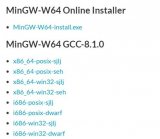
RK3588 SDK入门之编译使用篇

用户手册 | 全志T113-S3开发板——SDK编译指南

APM32F10xx进入低功耗模式的问题分析
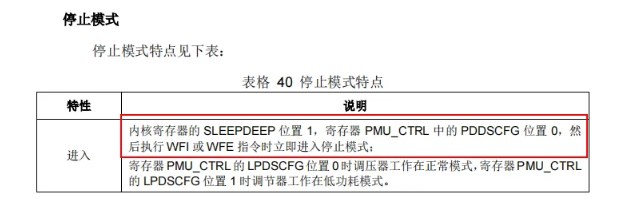
【GD32 MCU 移植教程】8、从 STM32F4xx 系列移植到 GD32F4xx 系
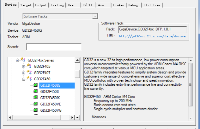
RK3568 编译sdk技巧
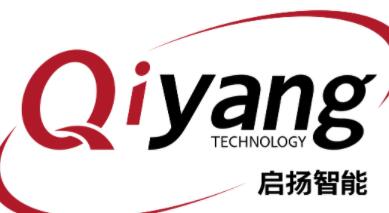
在IAR中使用KitProg3进行调试,无法检测到目标是怎么回事?
芯海通用 MCU应用笔记 :在 IAR 及 MDK 开发环境下使用 printf 函数重定向移植差异指南
在macos下SW4STM32编译,调用printf异常怎么解决?
CKS32F4xx系列FSMC功能简介
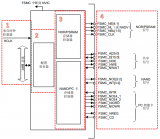




 APM32F4xx_SDK_V1.1中使用IAR9.3进行编译使用printf功能
APM32F4xx_SDK_V1.1中使用IAR9.3进行编译使用printf功能












评论